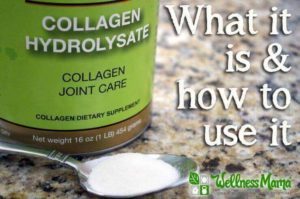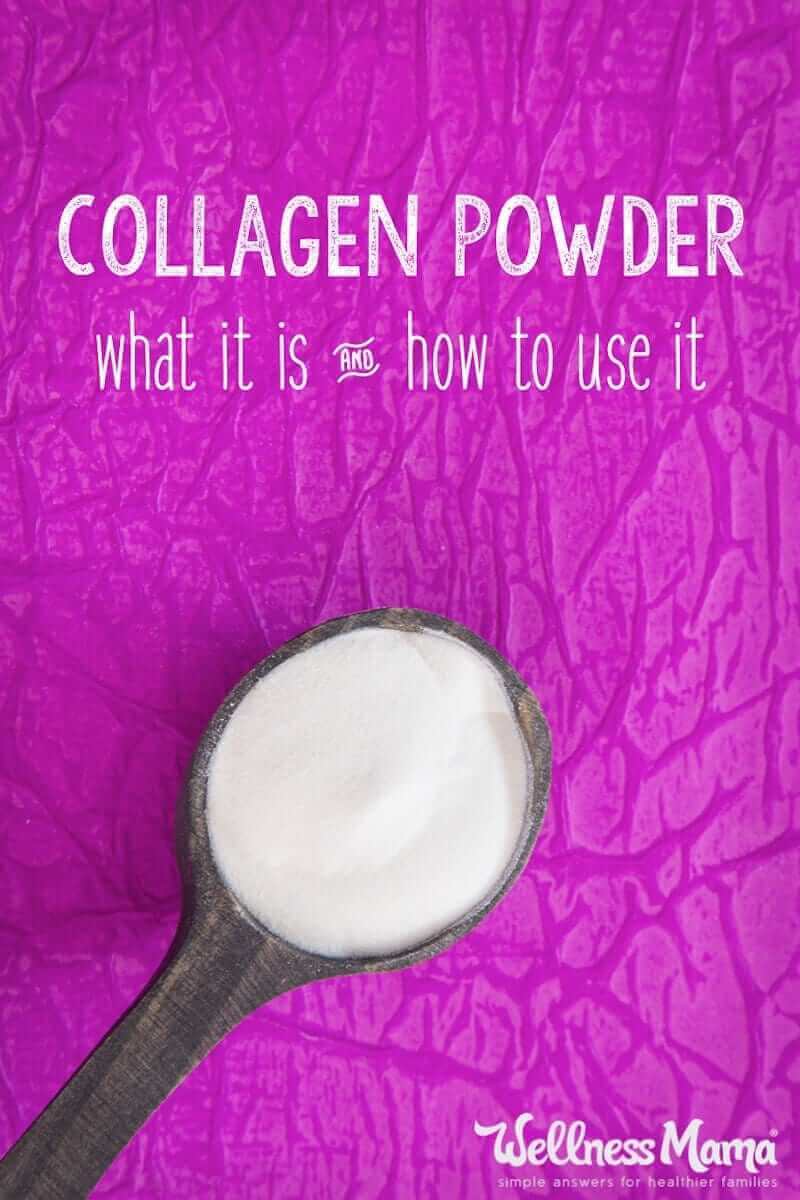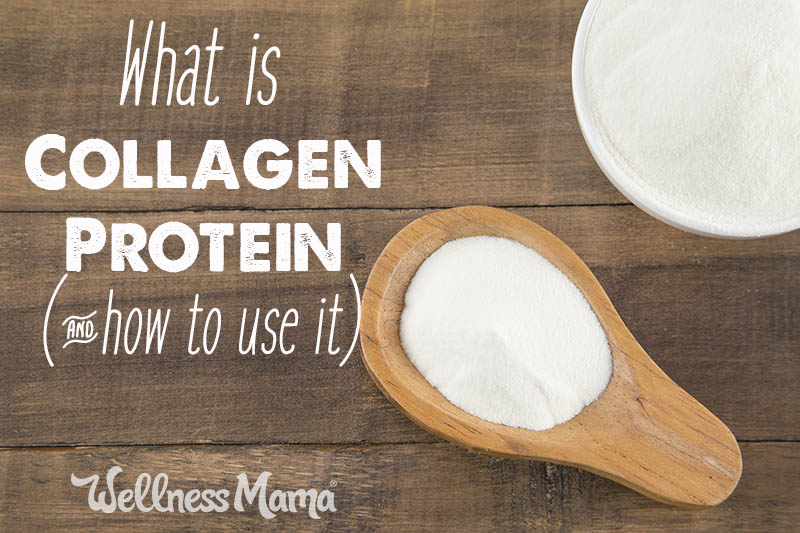I’ve been a big fan of gelatin since our family went on the GAPS diet and it helped my son be able to tolerate dairy again. I’ve also seen huge benefits with my skin, hair, and nails since I started incorporating more gelatin and collagen into my diet.
What Is Collagen?
In short, collagen is an insoluble protein that accounts for 1/3 of the protein in our bodies and 70% of the protein in our skin. Many people are familiar with its role in the skin, which is why it is in so many beauty products. What many people don’t realize is collagen is so much more than just a beauty remedy. (More on that later.)
The collagen molecule is a complex protein made up of over 1,000 amino acids, the main ones being proline, glycine, and hydroxyproline (in a unique triple helix configuration of three polypeptide subunits. (Sorry, science nerd moment!)
But what does this mean on a practical level?
Why We Need Collagen
It means collagen is incredibly strong. In fact, type I collagen (a type found in the human body) is stronger than steel gram for gram. It is fundamental to healthy cell reproduction, joints, connective tissue, and more.
The particular amino acids in collagen and gelatin are said to be especially beneficial in the body for:
- supporting hair, skin and nails
- for joint health
- to encourage skin elasticity and reduce the signs of aging
- improving digestion
- as a protein source
The important thing to know is that these amino acids come from bones and cartilege (usually from cows) and are not present in muscle meats. As we trade traditional cooking methods like making homemade bone broth for modern convenience, we are getting less and less collagen and gelatin in our diets.
More in a bit on how to make up the gap, but first:
How to Boost Collagen Protein (From the Inside Out)
Here’s the thing. All of those beauty products that contain collagen won’t do much for your skin. This is because collagen molecules are too big to be absorbed through the skin. That doesn’t mean collagen isn’t really beneficial though… just that we have to get it from the inside out.
So how to get it? There are a few ways:
Natural Sources of Gelatin
Collagen (and gelatin, its cooked counterpart) is naturally found in high quality broth and in cuts of meat that contain skin or bone. If you’ve ever made bone broth and had it “gel” when it cooled, this is due to the collagen naturally present in the bones and connective tissue, which becomes gelatin when cooked.
There are also gelatin powders like this that contain 6 grams of protein per tablespoon and are relatively odorless and tasteless. This makes them easy to mix into warm drinks or recipes for an extra boost of quality protein,
Natural Sources of Collagen
Collagen has many of the same properties as gelatin and is the form actually found in the body. When we lack collagen due to diet or aging, we need a way to get it from the inside out.
Collagen and gelatin aren’t interchangeable, but they both do have their advantages. Some people, especially those with severe digestive issues, won’t handle pure gelatin protein well until they address their digestive problems. Bone broth is a great option in this case, but another good option is collagen peptides (another name for hydrolyzed collagen/collagen hydrolysate), which is essentially a cold-water soluble and more easily digestible form of gelatin.
Because of the unique way hydrolyzed collagen is prepared, it has higher amounts of the amino acids that support healthy cell growth and reproduction especially in connective tissues, hair, skin tissue, cartilage, ligaments and so on. It also absorbs more quickly due to a lower molecular rate.
How to Use Collagen Hydrolysate and Gelatin Powders

My absolute favorite source of gelatin and collagen is homemade bone broth (or a high quality grass-fed bone broth like this one), but it isn’t always possible to have access to homemade broth.
As much as I love broth, there are also times (like a scorching August) when a cup of hot broth is not very appealing, so I prefer a different option instead.
Gelatin powder and collagen powder are great options that we use often instead of broth.
Gelatin Powder Uses
Gelatin is great not only due to its benefits but because of its ability to “gel” in recipes. It works really well in jellos, marshmallows, and other recipes for this reason.We use gelatin for making a lot of different gut-healthy recipes like:
This is the grass-fed gelatin that we use.
The one downside to gelatin powder… it only mixes into warm/hot liquids and clumps up in cold drinks because of its ability to gel. Enter collagen!
Hydrolyzed Collagen Powder Uses
Collagen powder won’t gel like regular gelatin, but it dissolves easily both in cold drinks (like smoothies) and hot drinks. I use it almost daily for protein and healthy fats added to:
Bonus: It’s not only good for you but adds a delicious creaminess and froth! We use collagen from both Bulletproof as well as Jigsaw Health. While the majority of collagen comes from bovine, there is marine collagen for anyone that needs the sourcing to come from fish or other marine life.
What We Do
We still drink bone broth regularly (either homemade or this brand). I also still use regular grass-fed gelatin in anything we need to “gel.” I’ve found that everyone in our family seems to digest the collagen hydrolysate/peptides form more easily, so now we use that most of the time for a quick boost of protein.
I’m curious- have you ever tried gelatin or collagen hydrolysate? How did it work for you? Share below!
This article was medically reviewed by Dr. Scott Soerries, MD, Family Physician and Medical Director of SteadyMD. As always, this is not personal medical advice and we recommend that you talk with your doctor.



Leave a Reply